Follow us on Telegram for the latest updates: https://t.me/mothershipsg
For an interview that is as long as a full length feature film, it probably takes superhuman focus (or pen and paper to take down notes) to really scrutinise Night Owl Cinematics (NOC) co-founder Sylvia Chan’s answers in response to Xiaxue’s questions.
As veteran journalist Bertha Henson noted, Xiaxue was a good interviewer. Indeed, Xiaxue covered a lot of ground and posed some uncomfortable questions.
But were Chan’s responses really answers or non-answers?
To be fair, Chan did address a few allegations such as:
- The chilli business that didn’t happen
- The workplace abuse
- Her punctuality issues
- The pet custody issue
- Her alleged involvement in misappropriating company funds
As Chan has now shared her side of the story (Tan’s alleged infidelity to Tan’s alleged failure of fiduciary duties as a director), one begins to observe more empathy online towards Chan’s plight and circumstances (see the comments on Youtube).





She has also made a second apology and said that she is fully cooperating with the authorities.
But after letting it stew for over 36 hours, we still have some lingering doubts over her answers to some of the bigger allegations.
1. Who is the big boss?
We may have been distracted by the revelation that Chan subsequently became the majority shareholder after her divorce with Tan in March 2020. And hence, we assumed that she holds all the power in the company.
After the interview, we are still confused about the power dynamics between Chan and Tan - who is the boss?
Chan has been CEO, while Tan has been the COO since the founding of NOC.
A quick check on their Linkedin accounts shows that this CEO-COO dynamic has remained stable throughout NOC’s history.
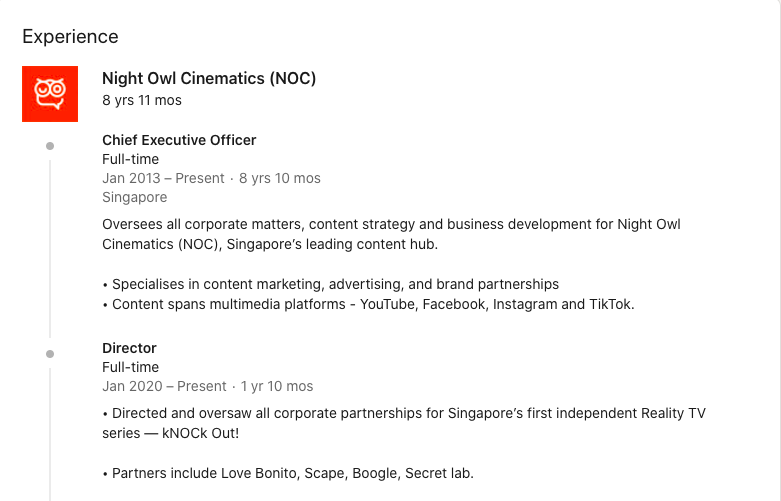 Source: Sylvia Chan's LinkedIn.
Source: Sylvia Chan's LinkedIn.
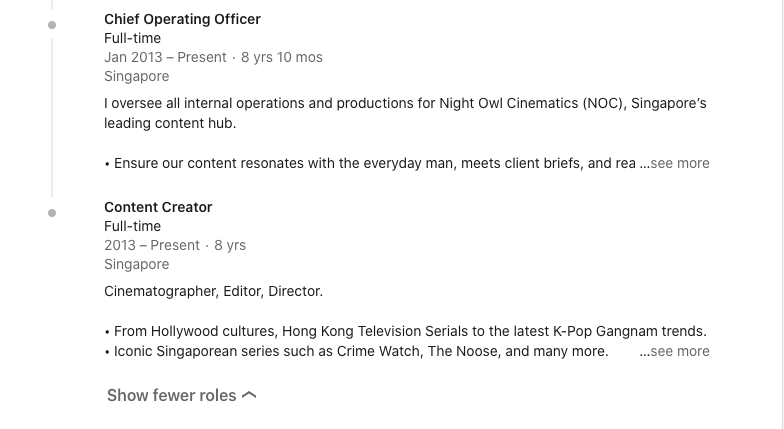 Source: Ryan Tan's LinkedIn.
Source: Ryan Tan's LinkedIn.
Hence, it is confusing when Chan said that Ryan actually holds the ultimate authority as the company’s "sole director".
She also said that Tan has the final say on all matters, especially on financial matters, since all the bank accounts are in his name.
Chan implied that it is not her who “signs on the biggest thing”. She then explained what she does, which is, among other things, to monitor vertical profitability.
Hence, the concerns raised in previous allegations seem to be more about the perception of power, rather than a legal view of it.
For example, some of the allegations lobbied against Chan in the relatively earlier part of the saga involved preferential treatment, and delayed salaries.
In fact, the day-to-day going-ons appear to be the least thoroughly addressed during the interview.
2. Who is in charge of making talents stay late?
Responding to allegations of employees being overworked and made to stay late, Chan did not directly address the question, but said that the media industry has very “flexible timing” in general.
On allegations that “nobody’s respecting their time”, Chan said that it is “unfair” to blame her as it is her job is to “ensure that [they] submit (the work)”, and that she doesn’t do the operations.
However, this still doesn’t tell us much about the nature of operations and work processes within NOC.
If it was Chan’s job scope to ensure that work is submitted on time, Xiaxue’s question on whether Chan failed to manage timelines and client expectations was also not addressed.
For instance, is it fair for Chan to ask her staff to finish a client’s work within a day? How about completing ten clients’ work within a day?
Instead, Chan said that there are some jobs which have timelines that are “really very tight”, and then there are seasons in which there are downtimes.
So, who made the employees stay late? Did they stay late because they had to work on an urgent task as part of “crunchtime”, or did the bosses make their employees work overtime because projects weren’t managed properly?
3. Was Chan’s brother’s salary backdated? If so, why?
Xiaxue asked about the allegations that Chan was just paying her brother, Sikeen, a salary so that he can get PR status.
Her first retort was "the thing is, he has always worked in NOC".
But that wasn’t the main thrust of Xiaxue’s question.
Chan said: “They’re saying he's a phantom worker… Then you have to show that I was not correct with my books, but I believe, and I know that our accounting is always done right. Because you know why? He’s actually working so why are we not paying him?”
It sounds like she’s saying: 1. NOC is paying Sikeen according to payroll, 2. If a company is paying somebody, the employee must be working, 3. Therefore, Sikeen has been working at NOC.
This is a strange reasoning to explain away the allegations. It ignores the fact that doubt was cast over (2) in the first place, because the claim is that NOC is paying him even though he's “not seen anywhere, doing any work” (according to Xiaxue in her video).
But she acknowledges that it’s hard to prove that someone is indeed working, so fair enough. Chan also said that Tan hates Sikeen, so she had asked her brother to work in the other office (which could explain why some people may not have seen him around).
However, her explanation still does not properly address the screenshot where it appears that Chan sought “a favour” for her brother’s salary to be resumed and backdated.
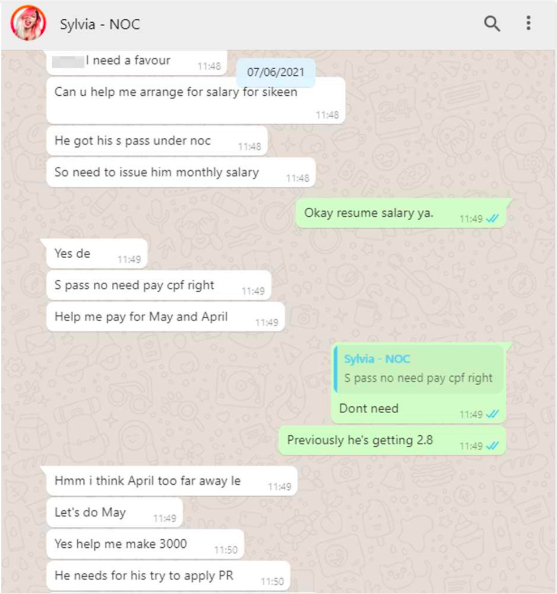 Source: EndtheSilence blog post.
Source: EndtheSilence blog post.
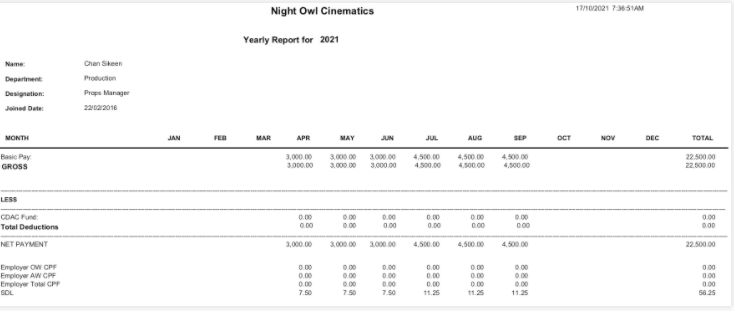 Source: EndtheSilence blog post.
Source: EndtheSilence blog post.
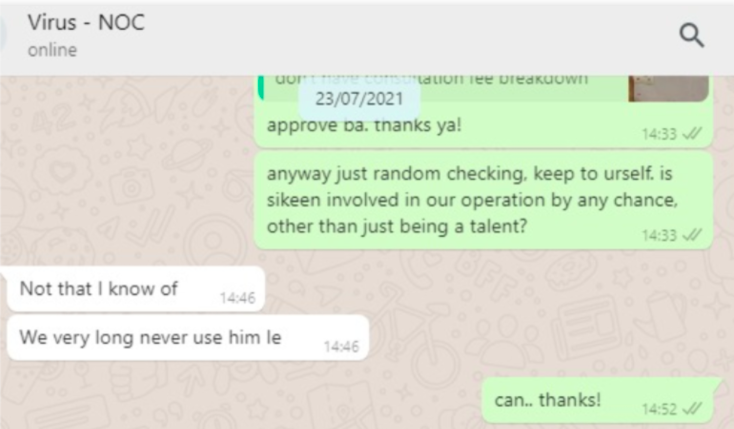 Source: EndtheSilence blog post.
Source: EndtheSilence blog post.
Chan said that Sikeen was “always a talent”, “always been here since day one”, and also props manager and producer for “a period of time”.
The screenshots, however, suggest that he needed to be issued a salary for the previous month. If Sikeen has been doing work for them all along, why was there a need for backdating salary payments? Does this mean that he wasn’t being paid for his work for a period of time (before April 2021)?
And if he had his salary stopped for an amount of time (in June 2021, screenshots purportedly show Sylvia agreeing to “resume” Sikeen’s salary), was it resumed for the purposes of applying for PR or for work that the finance executive didn’t know of?
However, the question isn’t about NOC not paying Sikeen.
It isn’t even about whether Sikeen deserves a pay, or whether Sikeen is paid a high salary to obtain a PR. In fact, Sikeen was previously paid S$2,800, which was a sufficient amount to get an S Pass.
The question here is why Sikeen wasn't paid regularly, and why he required a CEO's intervention to ensure that he was being paid at a specific moment in time, with a 50 per cent increment from one month to the next, from S$3,000 to S$4,500.
Read more:
Follow and listen to our podcast here
Top photo via Ryan Tan & Sylvia Chan's Instagram.
If you like what you read, follow us on Facebook, Instagram, Twitter and Telegram to get the latest updates.
